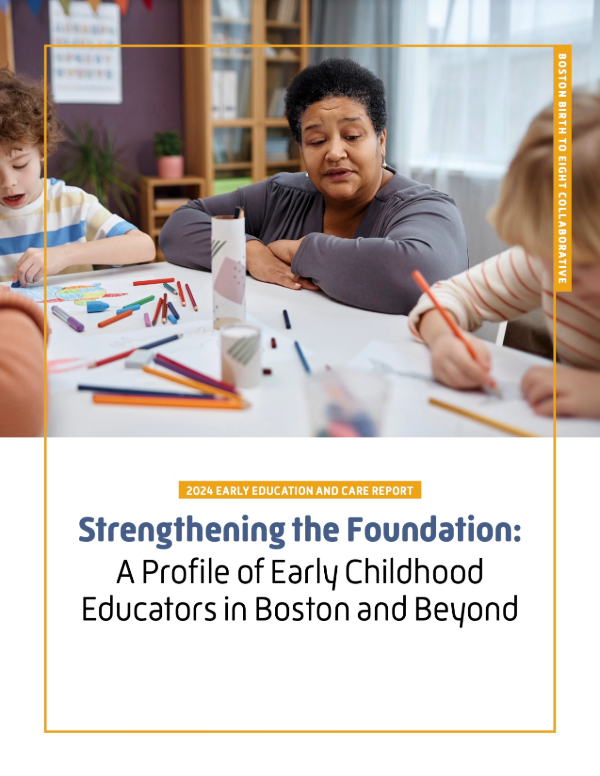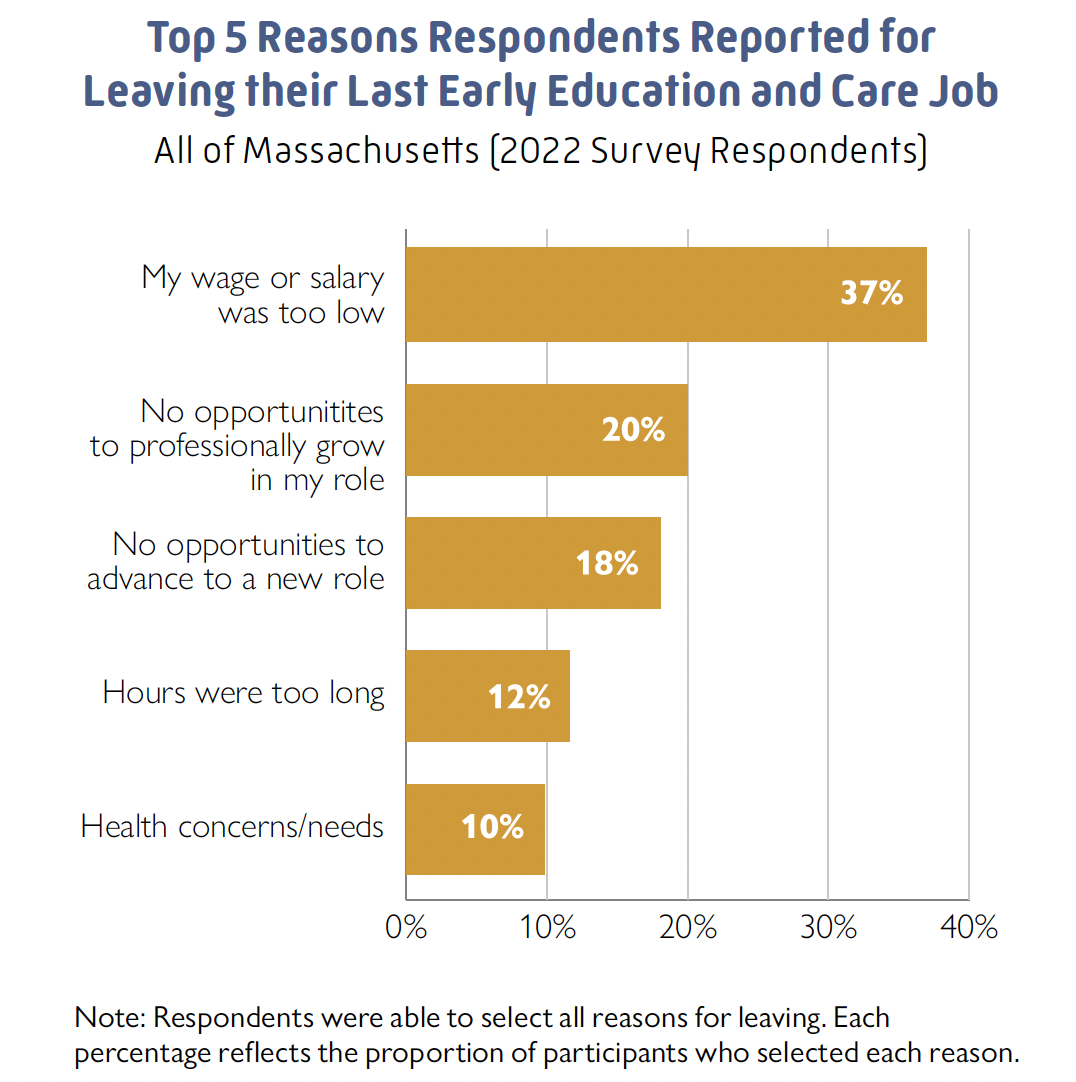State of Early Education and Care survey highlights wage, turnover effects on early education system
February 27, 2024
Boston – Results of a survey of more than 600 early education professionals by the Boston Opportunity Agenda in partnership with the Birth to Eight Collaborative and the City of Boston’s Office of Early Childhood show the systemic inequities facing the early education workforce. Low wages, staff shortages, and lack of benefits are continuing to strain early education centers in Greater Boston and beyond, even as the system slowly tries to recover from the COVID-19 pandemic.
The survey findings are available in a new report, 2024 State of Early Education and Care: Strengthening the Foundation: A Profile of Early Childhood Educators in Boston and Beyond, released today in an event held at the Boston Foundation. The survey, launched in late 2022 in Boston but expanded to include early educators statewide, provides a glimpse into the challenges facing family child care centers (FCCs) and center-based programs in Massachusetts.
The report also emphasizes several system-level challenges that must be addressed to attract and retain the early education workforce, such as equitable training and career opportunities and living wages, as prerequisites for high-quality early education and care in the classroom.
“We are fortunate to have thousands of dedicated early educators statewide who work diligently to provide valuable early education and care to children of all backgrounds, but the data show that the system as a whole is not sustainable without expanding our supports for these educators,” said Ayesha Cammaerts, Executive Director of the Boston Opportunity Agenda. “We appreciate the willingness of these educators to share their experiences with us as we continue to advocate for solutions that will make the system stronger and more sustainable to improve job quality, reduce turnover, and bring new educators to the field.”
Launched in 2022 as a survey of Boston early educators, the survey was expanded by request to eventually include more than 650 respondents, slightly more than half of them from Boston. While the Boston respondents were significantly more racially diverse than the statewide respondents, both samples skewed older, with well over half of respondents over the age of 45 – suggesting a need for targeted strategies to attract and retain younger talent and build leadership pathways to ensure vital, sustainable early education workforce.
An interesting demographic dichotomy appears in Boston when comparing family childcare centers (FCCs) and larger center-based programs. FCC providers are likely to have more experience than center-based teachers and are nearly four times as likely to be Hispanic or Latino. FCC providers were also less likely to have completed high school, college, or graduate-level programs – 60 percent of FCC educators say they received a CDA, a Child Development Associate credential to work in the sector.
“The differential in educational experience raises significant questions about how we can make pathways to the early education workforce more accessible,” said Kristin McSwain, Director of the City of Boston’s Office of Early Childhood. “We need to continue to fund credentials into the field that are stackable over time and continue to provide training in business and other skills to ensure the sustainability of our early education providers through the area.”


Across the sector – in Boston and beyond – high turnover has proven to be a primary challenge. The survey found that 39 percent of the centers in our sample had experienced a turnover rate of 20 percent or more, the level that federal authorities consider “high turnover.” And over 14 percent of centers said their turnover in the past year had exceeded 40 percent. A follow-up with a subset of centers illustrates the impact. In a recent survey of nine of the largest early education and care center groups in Boston, representing 1,236 child-care seats, respondents reported a total of 61 vacant positions as of February 2024, forcing the closure of 10 classrooms representing almost 100 infant, toddler, and preschool seats.
The reasons behind that turnover will be no surprise to those following the field. Respondents who left a previous job cited low wages (37%), a lack of professional growth opportunities (20%) or opportunities for career advancement (18%), as well as long hours (12%) as reasons for their job changes. Average wages for early education educators and administrators lag well behind other sectors, especially for early-career educators. The Boston data also show a need for more universal benefits, with just 24.5% of FCC educators and just over 80% of center educators and administrators receiving some benefits. Substantial majorities of center-based and FCC directors and administrators report working over 40 hours per week, along with significant percentages of early childhood educators.
Higher education has proven to be one avenue for early educators to enter the field, primarily through community colleges, with over 58% of the survey respondents saying they attended community college programs. Paying for higher education, however, remains a barrier – roughly half of center-based and FCC educators say they had to rely on family or work-study to pay for their education rather than loans or scholarships.
Investing in pathways and career trajectories is highlighted in the report as one of the key avenues for strengthening the system, including increased investment in courses and educational subsidies for early education students, expansion of apprenticeship opportunities, and replication of successful programs, many of which are highlighted in the report.
Researchers also call for redoubling advocacy for critically needed funding and the continuation of state and federal investments that increased wages and stabilized programs during the pandemic. The report also recommends making (C3) investments permanent in the state budget rather than an annual expenditure, with an emphasis on ensuring that centers and FCCs serving larger numbers of lower-income, private pay or families using vouchers are not penalized for being constrained by how much they can charge.
Uniquely, this survey collected data on broad economic sectors supported by early educators as they care for the children of the Commonwealth’s workforce, illustrating the critical support a healthy early education system provides to the broader economy.
Among the recommendations, the researchers make clear that increased investment is necessary, including ensuring that C3 grants are increased and made permanent. Additionally, the report recommends defining career pathways, credentialing, and apprenticeship pathways, expanding collaboration between state and municipal stakeholders and higher education to meet the needs of early educators, and replicating proven strategies to attract and retain a diverse workforce. Improvements in data collection and systems are needed to better inform policy and workforce development strategies.
The full report also includes an illustration of current career pathways in the early education system. The report can be downloaded from the Boston Opportunity Agenda website, and through the Boston Foundation reports library at tbf.org/reports.
